It is one of the most famous Scottish dishes and is enjoyed every year on Burns Night.
But experts are calling on meat lovers in Scotland to eat less haggis and more neeps and tatties.
Researchers at the University of Edinburgh say reducing consumption of beef, lamb and pork could help curb climate change.
If everyone ate no more than the dietary recommendation of 70 grams of meat a day, Scotland could reduce its total red meat consumption by 16 per cent, according to the researchers.
Professor Lindsay Jaacks, Senior Lecturer in Global Health and Nutrition at the University of Edinburgh, said: “There is no doubt that we need to change our diet to reduce our impact on the planet.”
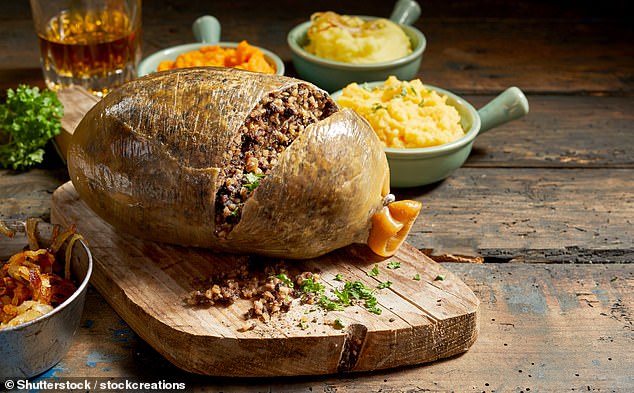
It is one of the most famous Scottish dishes and is enjoyed every year on Burns Night. But experts are calling on meat lovers in Scotland to eat less haggis and more neeps and tatties (file image)
The study analyzed data from the 2021 Scottish Health Survey, which asked 3,400 adults about their eating and health habits.
Researchers found that a significant number of people in Scotland eat much higher than recommended amounts of red meat and dairy.
On any given day, 86 per cent of Scots will eat at least one type of meat, while 99 per cent will consume some type of dairy product.
Among meat eaters, the average daily intake was 96 g; 32g of which were processed meat and 26g of red meat.
Beef alone accounted for a quarter of all meat consumed in the country, with spaghetti bolognese being a particularly common meal.
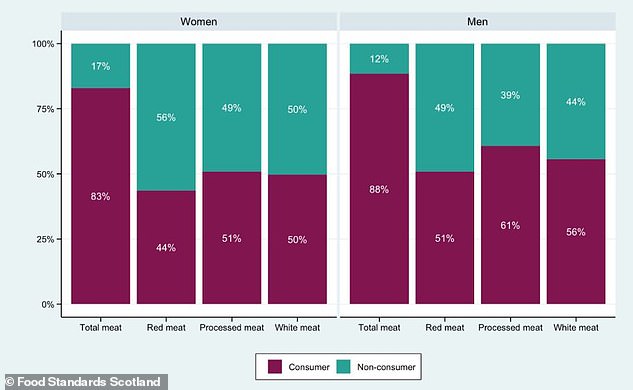

This graph shows how many men and women eat meat in Scotland. Men are more likely to consume meat regularly than women and eat all types of meat more frequently.
However, high levels of red meat consumption have a large impact on the climate.
Livestock farming contributes to global warming due to methane, nitrous oxide and carbon emissions from livestock and their supply chains.
A meat-rich diet also contributes to ongoing deforestation in places like the Amazon rainforest, as large areas are cleared to make way for livestock.
A 2023 study from the University of Oxford found that eating 100g of meat a day (less than a beef burger) produced four times more emissions than a plant-based alternative.
The UK’s climate change committee has recommended that the Scottish Government take action to encourage a 20 per cent reduction in all meat consumption by 2030.
To continue fighting climate change, this figure would have to increase to a 35 percent reduction by 2050.
While this may seem like a challenge, simply reducing consumption by big consumers would already get Scotland most of the way there.
If everyone who currently eats more than the recommended amount reduced their consumption to 70 grams a day, total meat consumption would decrease by 16 percent.
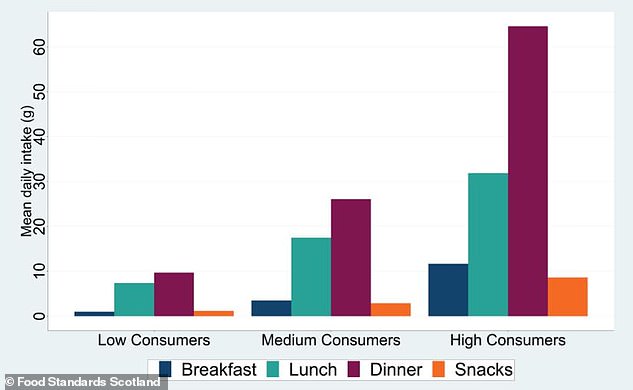

Scientists say that only the biggest meat consumers would need to reduce their consumption. Medium and low eaters (left and middle) already eat around the recommended limit of 70g per day, while high eaters (right) exceed this limit.
To achieve the 20 percent reduction goal, it is only necessary to reduce meat consumption to 60 grams per day on average.
Professor Jaacks said: Healthy, sustainable diets are all about balance.
“We found that some people in Scotland eat too much meat and could benefit from balancing their diet by replacing meat with other nutrient-dense foods available in Scotland, such as vegetables, beans and oily fish.”
Reducing meat consumption could also have a positive effect on the health of those who make the change.
The study found that eating just 70g of red meat a day would lead to a small reduction in average BMI and prevent about 10,000 cases of type 2 diabetes over 10 years.
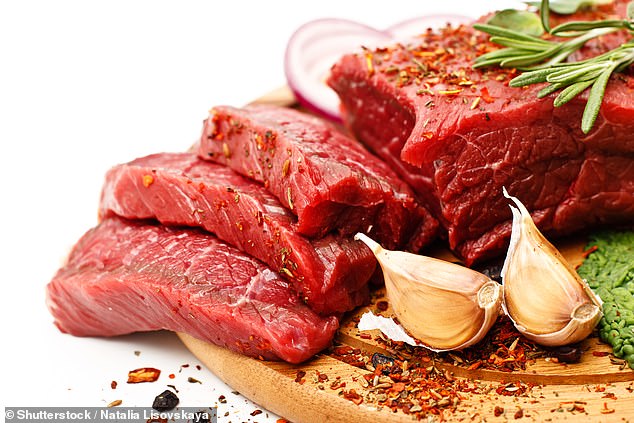

Reducing the amount of red meat consumed would not only help Scotland meet its climate commitments but would also prevent 10,000 cases of type 2 diabetes over the next 10 years (file photo)
However, scientists warn that reducing meat consumption would not be a good measure for everyone.
On average, Scots get around 26 per cent of their energy and 42 per cent of their protein from dairy and meat products.
Researchers found that stopping eating meat will not cause any harmful loss of protein, but some people could lose important nutrients.
Dr Fiona Comrie, senior public health nutritionist at Food Standards Scotland, says: “Although it is assumed that reductions in meat and dairy would be beneficial for both climate change mitigation and human health, the reality is more complex.” .
Scientists warn that the majority of adults living in Scotland have a low intake of at least one important nutrient.
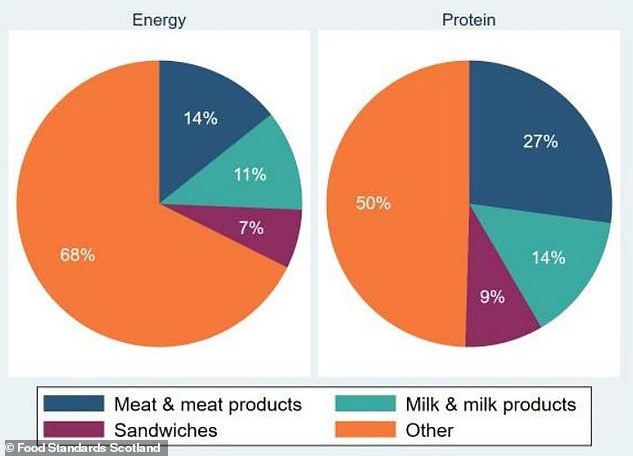

Experts say not everyone should try to cut back. As these graphs show, Scots get a lot of their protein and energy from dairy and meat, but the biggest concern is that people could miss out on important micronutrients.
Young people, in particular, are already at higher risk of nutrient insufficiency compared to adults.
Scots get about half their calcium, iodine, selenium and zinc from meat and dairy, as well as about three-quarters of their iron intake.
This means that, without careful consideration of how to promote alternatives, some groups in Scotland could see their nutrient intake worsen if they reduce meat consumption.
Dr Comrie added: “Given that the Scottish population’s diet is so poor, particularly in some subgroups, a ‘blanket’ reduction in meat and dairy consumption across the population cannot be recommended.”

